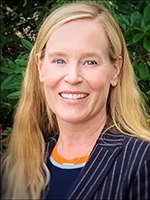Teresa Jackson, MD, DFÂÒÂ×ÊÓƵ
Candidate for Vice-President
 Teresa Jackson, MD, DFÂÒÂ×ÊÓƵ is the California Medical Director for the Hazelden Betty Ford Foundation including the Betty Ford Center in Rancho Mirage, CA.
Teresa Jackson, MD, DFÂÒÂ×ÊÓƵ is the California Medical Director for the Hazelden Betty Ford Foundation including the Betty Ford Center in Rancho Mirage, CA.
She serves as faculty for the Eisenhower Health/Hazelden Betty Ford Foundation Addiction Medicine fellowship and enjoys teaching. Dr. Jackson has worked in Arizona, Washington, and California in both the inpatient and outpatient settings. She serves on the Hazelden Betty Ford Foundation withdrawal management protocols and medications committee and is part of the team responsible for evaluating and treating health care providers at the Betty Ford Center.
Dr. Jackson’s philosophy emphasizes kindness and support for patients with substance use disorders, advocating for harm reduction, medications for the treatment of substance use disorders, and tobacco-free treatment.
Dr. Jackson currently serves on the ÂÒÂ×ÊÓƵ Board as the Region VIII Director and previously served on the Washington Society of Addiction Medicine Board of Directors.
She is the current chair of the Membership Council. The Membership Council has expanded student membership and introduced a program to retain early career physicians. She is also a member of the Ethics committee, and the Give Hope Now Task Force dedicated to fundraising for ÂÒÂ×ÊÓƵ.
She earned both her Doctor of Medicine and Bachelor of Science from the University of Arizona. In her personal time, she enjoys running, triathlons, and alpine skiing. Dr. Jackson lives in the beautiful desert of California with her husband and two dogs.
Candidate Questionnaire Responses
1. What have been your greatest contributions to ÂÒÂ×ÊÓƵ or to the field of addiction medicine over the last 10 years?
I currently serve on the ÂÒÂ×ÊÓƵ Board as the Region VIII Director. In this role, I have fostered collaborative educational events. I previously served on the Washington Society of Addiction Medicine Board of Directors.
As the chair of the Membership Council, I am dedicated to the future of addiction medicine by attracting diverse new members at all stages of their careers. Over the past three years, we launched two successful programs focused on retaining early career physicians and expanding student membership. My passion for nurturing the next generation of addiction medicine professionals is reflected in these initiatives, which ensure a robust and dynamic future for ÂÒÂ×ÊÓƵ.
I also serve on the Give Hope Now Task Force. I believe giving back to ÂÒÂ×ÊÓƵ both personally and through encouraging donations is vital to the success of the organization. I served on the Physician Wellness Committee at EvergreenHealth in Washington.
Additionally, my clinical work in Arizona, Washington, and California has been instrumental in bridging gaps in care. In Arizona, I established a buprenorphine bridge program to reduce recidivism among underserved populations at a Medicaid medication-assisted withdrawal management facility.
In Seattle, I provided outreach education to emergency department physicians, hospitalists, and primary care providers, promoting hospital-based buprenorphine and referrals to addiction medicine treatment.
I am passionate about not only helping patients reach sobriety, but also improving their overall health through lifestyle changes including smoking cessation, diet, and exercise. Throughout my career in addiction medicine, I have mentored medical students and residents interested in addiction medicine. My dedication to both clinical excellence and the professional development of future leaders underscores my commitment to the field of addiction medicine.
2. How would your election to the ÂÒÂ×ÊÓƵ Board of Directors benefit ÂÒÂ×ÊÓƵ and the field of addiction medicine?
As an organized leader and enthusiastic volunteer, my election as Vice President would bring a unique blend of energy, commitment, and strategic vision to ÂÒÂ×ÊÓƵ.
My extensive experience in fundraising and philanthropy, combined with a track record of embracing new roles within ÂÒÂ×ÊÓƵ, equips me to serve effectively in this position.
One of my primary goals as Vice President would be to recruit new, diverse members while retaining practitioners across all generations. Understanding the varied communication preferences of different age groups, from social media for younger members to phone outreach for more seasoned physicians, is crucial.
By leveraging the regional and local chapter structures, I aim to enhance our communication techniques, thereby improving membership recruitment and retention. Moreover, I believe in the power of education and community outreach to elevate addiction medicine to a standard treatment modality.
Increasing access to addiction treatment is imperative, and I am committed to collaborating with ÂÒÂ×ÊÓƵ leaders to advocate for medications for the treatment of SUD as the standard of care. I will continue to mentor students, physicians, advanced practice providers, and nurses, ensuring that our future workforce is well-prepared and deeply compassionate.
